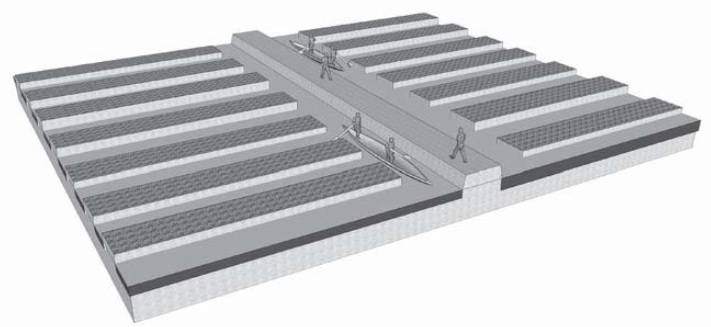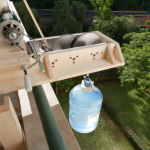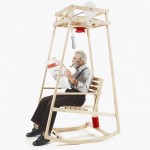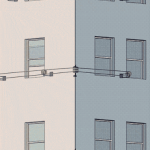“There’s currently a virtually endless supply of places you could install solar panels that DON’T have cars driving over them.” Read more at Equities and check out the comments at Slashdot.
Lost Crops of Africa
“Like Asia and the Americas, the continent of Africa is blessed with a rich tropical flora. Many of the 50,000 or so plants that evolved within its forests and savannas ripen fruits to tempt the myriad wild creatures into spreading their seeds. Speaking generally, Africa has as many of these tasty morsels as tropical Asia or America.
This fact, however, is something one would never guess by looking in produce markets or college textbooks. Today, American and Asian species dominate tropical fruit production worldwide, including within Africa itself.
For this, there is good reason. Africa’s fruits have not, by and large, been brought up to their potential in terms of quality, production, and availability. Geographically speaking, few have moved beyond Africa’s shores; horticulturally speaking, most remain poorly known. Thus, the vast continental landmass lying between Mauritania and Mauritius contains a cornucopia of horticultural, nutritional, and rural-development jewels still waiting to be cut and polished.”
- Lost Crops of Africa: Volume 1: Grains (1996)
- Lost Crops of Africa: Volume 2: Vegetables (2006)
- Lost Crops of Africa: Volume 3: Fruits (2008)
The three volumes can be consulted online at The National Academic Press. Previously: Lost crops of the Incas. Via Avantgardens.
Older Buildings Increase Urban Vitality
 “All across America, blocks of older, smaller buildings are quietly contributing to robust local economies and distinctive livable communities. This groundbreaking study demonstrates the unique and valuable role that older, smaller buildings play in the development of sustainable cities.
“All across America, blocks of older, smaller buildings are quietly contributing to robust local economies and distinctive livable communities. This groundbreaking study demonstrates the unique and valuable role that older, smaller buildings play in the development of sustainable cities.
Building on statistical analysis of the built fabric of three major American cities [San Francisco, Seattle, and Washington, D.C.], the research demonstrates that established neighborhoods with a mix of older, smaller buildings perform better than districts with larger, newer structures when tested against a range of economic, social, and environmental outcome measures.”
“Older, Smaller, Better. Measuring how the character of buildings and blocks influences urban vitality“, National Trust for Historic Preservation, May 2014. Via Lloyd Alter.
Precolumbian Causeways and Canals
“In contrast to the Western obsession to drain what are considered marginal wetlands for agriculture, farmers in the Bolivian Amazon may have intentionally expanded wetlands and wetland productivity through earthwork construction, which impedes, rather than enhances, drainage.
The precolumbian farmers did not use causeways as dikes to prevent inundation of fields and settlements, but rather to expand and enhance inundation for agricultural production.
At the same time, impounding water with well-placed causeways and the creation of canals improved and extended the season of transportation by canoe across the landscape. The grid-like structure also permanently marked land tenure in a highly visible manner.” [Read more…]
Automated Ethics & Driverless Cars
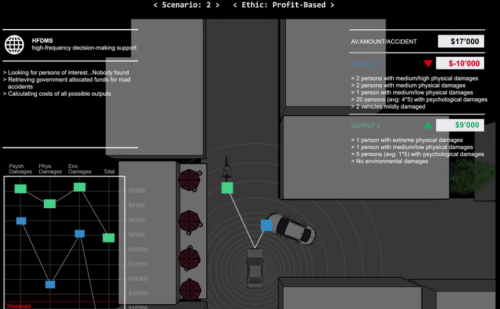 “Modern motor vehicles are safer and more reliable than they have ever been – yet more than 1 million people are killed in car accidents around the world each year, and more than 50 million are injured. Why? Largely because one perilous element in the mechanics of driving remains unperfected by progress: the human being.”
“Modern motor vehicles are safer and more reliable than they have ever been – yet more than 1 million people are killed in car accidents around the world each year, and more than 50 million are injured. Why? Largely because one perilous element in the mechanics of driving remains unperfected by progress: the human being.”
“Enter the cutting edge of machine mitigation. Back in August 2012, Google announced that it had achieved 300,000 accident-free miles testing its self-driving cars. The technology remains some distance from the marketplace, but the statistical case for automated vehicles is compelling. Even when they’re not causing injury, human-controlled cars are often driven inefficiently, ineptly, antisocially, or in other ways additive to the sum of human misery.”
“What, though, about more local contexts? If your vehicle encounters a busload of schoolchildren skidding across the road, do you want to live in a world where it automatically swerves, at a speed you could never have managed, saving them but putting your life at risk? Or would you prefer to live in a world where it doesn’t swerve but keeps you safe?”
Quoted from: Automated Ethics, Tom Chatfield, Aeon Magazine. The image is from Ethical Autonomous Vehicles, a research project and video by Matthieu Cherubini. Three distinct algorithms have been created – each adhering to a specific ethical principle/behaviour set-up – and embedded into driverless virtual cars that are operating in a simulated environment, where they will be confronted with ethical dilemmas. Via InternetActu.
Agricultural Heritage Systems
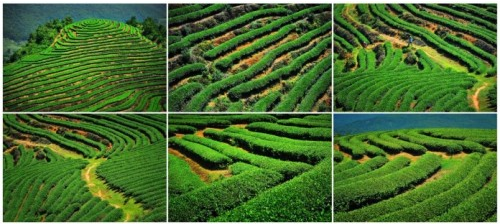 Six traditional farming systems in China, Iran and South Korea known for their unique characteristics and approaches to sustainability have been designated Globally Important Agricultural Heritage Systems (GIAHS) by the Food and Agriculture Organization of the United Nations (FAO).
Six traditional farming systems in China, Iran and South Korea known for their unique characteristics and approaches to sustainability have been designated Globally Important Agricultural Heritage Systems (GIAHS) by the Food and Agriculture Organization of the United Nations (FAO).
They include Iran’s Qanat Irrigation system, an ancient network of farms that have survived for nearly three millennia; a 22-thousand-kilometer system of black stone walls built from volcanic rock in Jeju, South Korea; and the traditional Gudeuljang Irrigated rice terraces in Cheongsando, South Korea.
Also on the list are a trio of sites in China: the unique Xinghua Duotian Agrosystem, famous for its method of water-land utilization; the historic Jasmine and Tea Culture System of Fuzhou City; and, the Jiaxian Traditional Chinese Date Gardens. The sites were officially recognized during the 28-29 April meeting of the GIAHS Scientific and Steering Committee at FAO headquarters in Rome.
These new designations bring the number of GIAHS systems to a total of 31 sites located in 14 countries in Africa, Latin America and Asia. The sites are considered models of innovation, sustainability and adaptability, delivering important benefits to the ecosystem. The GHIAS website has extensive documentation about most of these agricultural heritage systems. Picture: The Jasmine and Tea Culture System of Fuzhou City, China.

